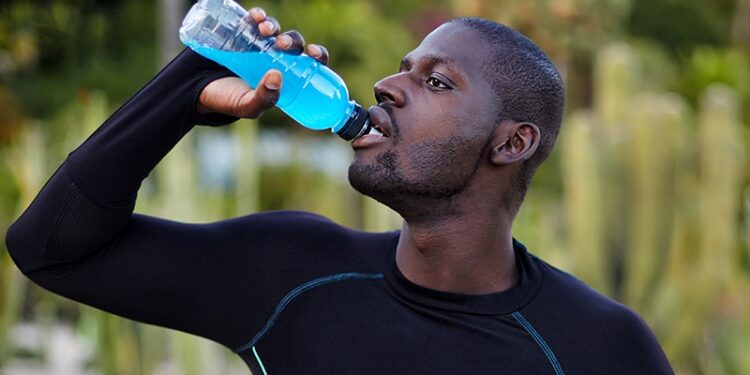Every gym in America is awash in neon. The rainbow array of sports drinks promises to transform weekend warriors into athletic dynamos.
For decades, these beverages have occupied a curious space in American consumer culture, somewhere between medicine and marketing, between science and snake oil. Now comes a study showing sports drinks might improve athletic performance. Sort of.
Researchers from Peking University in Beijing, China, recently presented a poster at the American Society for Nutrition (ASN) 2025 Annual Meeting in Orlando, Florida, from what appears to be a rigorous experiment: 23 trained adults who consumed a multi-ingredient sports drink performed 15% better during high-intensity exercise than when they drank a placebo beverage.
The drink contained a blend of macronutrients and micronutrients: Sugar for immediate energy, taurine and lysine as amino acids, inositol for cellular function, caffeine as a stimulant, and niacin and vitamins B6 and B12 to help metabolize food into energy.
The patients experienced less fatigue, maintained higher energy levels, and showed improved metabolic markers that suggested their bodies were preserving muscle protein during exercise, according to the researchers.
“I wouldn’t say the findings are shocking or excitingly novel,” said Andrew Jagim, PhD, director of Sports Medicine Research at Mayo Clinic Health System, in La Crosse, Wisconsin. The participants were already trained athletes performing structured, 100-minute exercise sessions, a far cry from the typical American’s relationship with physical activity. According to the US Department of Health and Human Services, adults should spend at least 150 min/wk doing aerobic exercise, but only two thirds of Americans meet this guideline.
This disconnect between laboratory conditions and real life gets to the heart of what Stella Volpe, PhD, MS, head of the Department of Human Nutrition, Foods, and Exercise at Virginia Tech University in Blacksburg, Virginia, calls the fundamental question: “For the average person who might be exercising 30 minutes a day, likely they don’t need something like this. Likely they are fine with just water.”
Jose Antonio, PhD, MS, the CEO of the International Society of Sports Nutrition and professor of health and human performance at Nova Southeastern University in Fort Lauderdale, Florida, concurs. “Traditionally, sports drinks have been shown for decades to improve performance, reduce fatigue, etc.,” Antonio said. “It often depends on what the ingredients are. We already know caffeine is effective. The most important components of this sports drink are, of course, the fluid itself, but [also] the sugar and caffeine. The rest of it has a minor effect.”
Sports drinks can be dense in calories. A 16-oz bottle of AMP Energy, for example, is 220 calories per serving compared with 155 for a 12-oz serving of Coca-Cola. For Jagim, the question becomes one of benefits and costs: “Are those extra calories in that drink really worth what they’re chasing in terms of just burning more calories during the workout?”
“When I train or race, I focus on two things [in a sports drink]: Sugar and caffeine,” he added. “The rest is ok, but for most, it doesn’t matter. Don’t trip over dollars to pick up pennies.”
But a psychological dimension complicates the purely nutritional calculus. Volpe, a professional athlete on the USA Masters field hockey team, said she will “hydrate better if I drink more.”
Consuming a beverage that tastes better than water can improve overall fluid intake. If a sports drink gets someone to stay properly hydrated during exercise, as long as they do not have diabetes or are trying to lose weight, the modest caloric cost might be worth paying. “I’d say go for it,” she said.
Jagim and Antonio agree valuable future research would be testing different treatment groups using different versions of the same drink. “Then you’d be able to answer that question of which ingredient is the more important one here,” Jagim said. “Is it the carbohydrate or the caffeine? Or is it truly, when we combine them, we get that synergistic benefit, where they collectively help each other make you feel better and perform better?”
Antonio, Jagim, and Volpe reported having no relevant financial conflicts of interest.
Jo Shorthouse is a London-based journalist with 17 years of editorial experience covering the healthcare industry for leading global publications.
Source link : https://www.medscape.com/viewarticle/are-sports-drink-just-colorful-delusions-2025a1000g7x?src=rss
Author :
Publish date : 2025-06-18 08:33:00
Copyright for syndicated content belongs to the linked Source.














